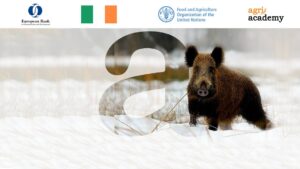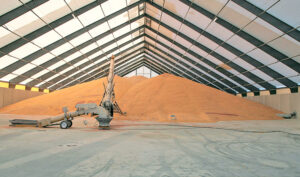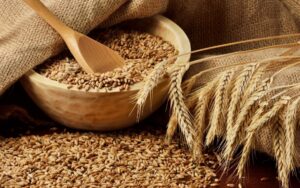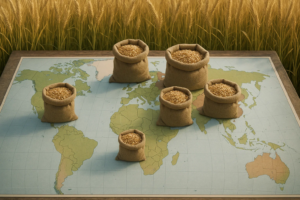
AgriAcademy, a professional online course platform for agribusiness, announces the launch of a new free online course, ‘Biosecurity for Hunting Farms’, developed by experts from the Food and Agriculture Organisation of the United Nations (FAO) in response to one of the most serious threats to livestock and food security – African swine fever (ASF).
African swine fever remains one of the key biological risks for Ukraine. The virus is highly resistant in the environment and circulates continuously among wild boar populations, posing a constant threat to domestic livestock, hunting farms and related sectors.
That is why FAO experts have developed a specialised training course based on international experience in combating ASF, adapted to Ukrainian realities and wartime conditions.
What the course is about
The course focuses on the practical aspects of biosecurity for hunting farms in Ukraine, using ASF control as an example. It examines in detail the logical and effective sequence of actions applied in EU countries and other regions of the world:
Who is this course for
The training is designed for:
Practical outcome for participants
Upon completion of the course, participants will be able to:
Training format
The course includes video lectures, analytical materials, practical tools, real-life case studies and a final test. Training is conducted online in a convenient 24/7 mode.
Course author and lecturer
Oleksandr Revnivtsev, FAO international consultant on animal husbandry.
Training on the course is free and open to all registered users of the AgriAcademy platform.
Participants can study the materials online at their convenience, without time restrictions, and after successfully completing the final test, they will receive a certificate.
As a reminder, AgriAcademy – is a free online learning platform created on the initiative of the EBRD as part of its food security support programme in Ukraine. Its goal is to strengthen the competitiveness and sustainable development of agriculture, which has suffered significant losses due to the war.
The creation and management of the platform (including the development of courses, training tours, etc.) is carried out with the support and funding of the EBRD, as well as:
The AgriAcademy website currently offers over 30 free online courses for Ukrainian agribusiness professionals. Register and take courses at your convenience!

The Global Environment Facility (GEF), under the leadership of the Food and Agriculture Organization of the United Nations (FAO), has approved eight projects totaling nearly $60 million aimed at improving agri-landscape management, developing climate-oriented and biodiversity-friendly livestock farming, and restoring forest, coastal and marine ecosystems.
According to a press release from the FAO, Ukraine will receive $5.4 million in funding to restore and maintain accessible forests and agroforestry systems to ensure climate resilience, enhance ecosystem services, and promote green recovery from the effects of war.
In addition, Tanzania will receive $2.4 million, Congo – $6 million, Bangladesh – $9.2 million, India – $9.9 and $8.8 million, Mexico – $8 million, and Senegal – $8.9 million.
The approved projects will attract about $429 million in co-financing and improve the management of 305,000 hectares of protected areas on land and at sea. They also provide for the restoration of 314,000 hectares of landscapes, improved management of 1.2 million hectares of productive land, and a reduction of 84.5 million tons of greenhouse gas emissions, benefiting more than 1 million people on four continents, the FAO said.
“Our portfolio and partnership with the GEF have become more integrated and effective over the years, allowing us to more effectively implement four areas of improvement, leaving no one behind: improving production, improving nutrition, improving the environment, and improving lives,” said FAO Director-General Qu Dongyu, whose words are quoted in the statement.
The FAO-GEF partnership currently provides 142 countries with funding for agrifood system solutions. The FAO-GEF portfolio for supporting environmental, climate, and biodiversity conservation measures in agriculture and food systems exceeds $2 billion in grant funding and has already attracted more than $14 billion in co-financing.

The Food and Agriculture Organization of the United Nations (FAO) has completed the distribution of 615 modular grain storage facilities to small and medium-sized farms in seven frontline areas, the FAO press service reported on Facebook.
The FAO specified that this initiative was implemented with the support of the governments of Canada and Japan in close cooperation with the Ministry of Economy, Environment, and Agriculture. The FAO is convinced that the program contributes to stabilizing the work of farms, preventing post-harvest losses, and ensuring the continuity of agricultural production.
Farmers could apply to participate in the program through the State Agrarian Register (DAR). In 2025, the FAO received 747 applications from producers who cultivate between 200 and 1,000 hectares. After verification, 615 farms were selected to receive modular grain storage facilities. The distribution took place in seven regions: Chernihiv (62), Dnipropetrovsk (116), Kharkiv (124), Kherson (14), Kirovohrad (84), Mykolaiv (128), and Odesa (87).
This initiative is part of a broader Grain Storage Support Strategy that FAO and partners have been implementing since 2022 in response to a critical shortage of storage capacity. During this time, Ukrainian agricultural producers have received a wide range of storage solutions – more than 37,000 grain sleeves, 105 sets of loading and unloading equipment, and a total of 859 modular grain storage facilities. Collectively, this support has enabled farmers across Ukraine to preserve more than 8 million tons of grain and sustain agricultural production in wartime conditions.
Despite significant progress, the lack of storage infrastructure remains a key constraint to the recovery of the agricultural sector, especially in frontline and recently liberated areas, the FAO stressed. As preparations for the 2026 season get underway, the sustainable development of modern and secure grain storage facilities will remain critical to protecting livelihoods and preserving national food production.
“For farmers, the ability to safely store their harvest is not just about grain. It’s about peace of mind, about the confidence that months of hard work will not be lost. These storage facilities give Ukrainian farmers what is especially needed today in times of war: stability and the ability to look to the future with hope. We will continue to support them on this path,” assured Shakhnoza Muminova, Head of the FAO Office in Ukraine.
FAO, together with its partners, plans to provide support to approximately 100 more farmers in early 2026, but the scale of needs far exceeds available resources. Strengthened cooperation and continued active involvement of the international community will be key to enabling farmers to withstand ongoing challenges and contribute to Ukraine’s long-term recovery, the organization believes.

According to the Food and Agriculture Organization of the United Nations (FAO) and the United States Department of Agriculture (USDA), global wheat production in 2025 is forecast to reach around 809.7 million tons, which is 1.3% higher than in 2024.
The growth is expected to be driven by increased yields in Canada, Kazakhstan, China, and India, while southern Europe and North Africa remain at risk of lower production due to drought.
“The outlook for the global wheat market remains generally positive, and global stocks at the end of the season will remain stable despite active exports from the Black Sea region,” the FAO Cereal Supply and Demand Brief notes in its October review.
Top 20 countries in the world by wheat production in 2025 (FAO and USDA estimates)
These twenty countries produce more than 90% of the world’s wheat.
Despite overall growth in yields, global wheat stocks could decline by 1.6% to around 312 million tons by the end of 2025. This is due to increased domestic consumption in Asia and the Middle East, as well as active exports from Russia, Ukraine, and Australia.
Average global wheat prices remain volatile, but FAO analysts predict their relative stabilization while maintaining harvest and stock volumes.
Despite the war, Ukraine retains its status as one of the largest grain exporters. According to estimates by the Ministry of Agrarian Policy, in the 2024–2025 marketing year, the country exported about 15 million tons of wheat, supplying it to Egypt, Indonesia, Spain, Turkey, and Tunisia.
Ukraine ranks 11th–12th in the world in wheat production and is among the top five global exporters thanks to its high yields and logistics routes through the Danube and Baltic ports.
A detailed overview of the world’s major wheat producers from 1970 to 2024 can be found in the Experts Club analytical video: Watch on YouTube

From October 28 to November 17, 2025, grape growers and winemakers in the Odessa region can apply for grants from the Food and Agriculture Organization of the United Nations (FAO) in cooperation with the Ministry of Economy, Environment and Agriculture of Ukraine, with financial support from the Italian government.
According to information on the Ministry of Economy website, winegrowers and winemakers registered in the State Agrarian Register (SAR) who cultivate between 0.5 and 20 hectares of vineyards in the Odessa region are eligible to participate in the program.
Selected participants will be able to receive grant support ranging from $10,000 to $25,000. The amount will depend on production volumes and justified needs.
The new FAO program aims to develop Ukraine’s wine sector by expanding access to modern equipment, quality planting material, and technical support, as well as introducing market-oriented approaches that will ensure the sustainable development of small producers.
According to Shakhnoza Muminova, head of the FAO Office in Ukraine, quoted in the ministry’s publication, the initiative is a step in the long-term cooperation with the Ukrainian government to strengthen the rural economy and restore value chains in the agri-food sector.
The program also provides for technical support, training, and consulting, as well as assistance in implementing a system of protected geographical indications to increase the competitiveness of Ukrainian wines in domestic and foreign markets.

According to data from the Food and Agriculture Organization of the United Nations (FAO), in 2024 Ukraine ranked 9th in the world in wheat production, producing about 23.4 million tons of grain. This information is presented in a new study by Experts Club, based on FAOSTAT statistics and the video “Wheat Production by Country (1991–2024)”.
The top three wheat producers remain traditionally stable:
China — 136 million tons,
India — 113.9 million tons,
Russia — 81.6 million tons.
These three countries account for nearly half of global wheat production and play a crucial role in the world’s agricultural system.
They are followed by:
United States — 53.6 million tons,
France — 35.9 million tons,
Canada — 35.9 million tons,
Australia — 34.1 million tons,
Pakistan — 31.4 million tons,
Ukraine — 23.4 million tons,
Germany — 21.5 million tons.
The second ten producers are opened by Turkey (19 million tons) and Kazakhstan (18.6 million tons), with Italy (6.9 million tons) closing the list.
The Experts Club video analysis demonstrates significant structural changes in global wheat production over the past three decades. The video covers the period from 1991 to 2024. During this time, China and India have almost doubled their production thanks to increased yields and consistent government support for the agricultural sector.
Russia and Ukraine, after a sharp decline in the 1990s, made a remarkable recovery: in the early 1990s, Ukraine produced around 15 million tons, while by 2024 the volume had increased to 23–24 million tons — despite war-related risks and export restrictions.
Kazakhstan, traditionally focused on exports, has maintained its position, supplying grain to Central Asia and parts of China.
Despite military actions and damage to part of its infrastructure, Ukraine remains one of the world’s leading wheat exporters. The main factors behind this are high yields in southern and central regions, improved logistics through Danube ports, and export routes via Romania and Bulgaria.
According to FAO, in 2024 Ukraine exported about 17 million tons of wheat, keeping the country among the three largest global grain suppliers, along with Russia and the United States.
Experts from Experts Club note that growth in production across Asia and CIS countries compensates for declining yields in Europe and North America, which are affected by droughts and climate change. At the same time, Turkey, Iran, and Egypt are strengthening their roles as regional centers of processing and import.
Global markets expect wheat prices to stabilize within the range of 230–250 USD per ton, provided there are no new geopolitical shocks.
“Ukraine’s position in the TOP-10 global wheat producers is a testament to the resilience of its agricultural sector, even during wartime. With the expansion of domestic processing, Ukraine can reach 25–27 million tons of production in the coming years and strengthen its place among the world’s top five exporters.
At the same time, the grain market is becoming increasingly technology-driven: digitalization of agribusiness, precision farming, and climate-resilient wheat varieties will determine leadership in the next decade,” said Maksym Urakin, co-founder of the analytical center Experts Club.
Ukraine remains one of the few countries where the agricultural sector accounts for about 40% of foreign currency earnings. In 2024, wheat ranked second in export volume after corn, and revenues from grain sales exceeded 6 billion USD.
According to Experts Club forecasts, if the pace of infrastructure recovery continues and weather conditions remain favorable, Ukraine’s wheat production may reach 25 million tons in 2025, and exports could exceed 18 million tons.
The study was prepared by the analytical center Experts Club based on data from FAOSTAT, USDA, and IGC.
The video analysis “Wheat Production by Country 1991–2024” is available on the Experts Club Ukraine YouTube channel.
AGRICULTURE, EXPERTS CLUB, EXPORT, FAO, GLOBAL PRODUCTION, UKRAINE, WHEAT